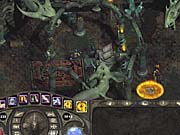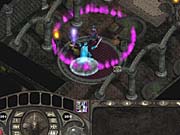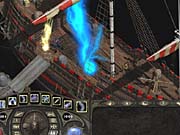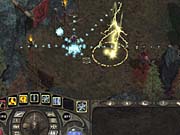Lionheart Preview
Interplay pays us a visit and shows off the latest Black Isle role-playing game.
It seems like most of the games that feature an alternate-history story line use different outcomes of World War II as their premise. Thankfully, Black Isle Studios' upcoming RPG, Lionheart, isn't set during World War II. Instead, it opens with the third Crusade. This time, though, a disjunction is created during the Crusade, releasing spirits and various sorts of magic into the world. To prevent this from happening again, King Richard the Lionheart of England and the head of the Turkish Empire hide certain sacred artifacts around the world, but the effects of the disjunction have already been felt, and suddenly people around Europe are imbued with the ability to use magic.

Four hundred years later, the Spanish Inquisition is well under way, but instead of targeting heretics, the Inquisition targets specific types of magic users. This presents a problem for England, which turns a blind eye to magic users, so as a result of this situation, the two countries are seemingly on the verge of war. You begin your adventure in Lionheart as a magic user who's been captured by slave traders, sold to the Inquisition, and thrown into a prison beneath the town of Barcelona, Spain, which was nearly destroyed in the cataclysm that occurred during the Crusades.
But before embarking on a journey that will take you through much of Western Europe, you'll have to create your character. Humans are broken down into three different subraces in Lionheart because the release of magic caused various sorts of mutations. Humans who were not affected by magic are simply referred to as purebloods. The members of the second subrace, the democyns, naturally have magical powers, but their outward appearance only reveals slight traces of their demonic bloodlines, so they're not as heavily persecuted by the Inquisition. The third subrace, the sylvants, are a group of people who are highly in tune with magic and have a distinct physical appearance that raises the ire of the pureblood population. But they aren't as heavily persecuted as the feralkin, whose appearance resembles that of a beast because of their close ties to the bestial spirits.

Each of these races has different bonuses and penalties for certain skills during the character creation process, so you'll have to pay attention to these differences when deciding on the type of character you want to have and how you want non-player characters to view him or her in the world. Of course, you'll also find some of the standard character creation elements in Lionheart. Your character has several base statistics, including strength, perception, endurance, charisma, intelligence, and luck. Endurance relates to the amount of hit points your character will have, while charisma determines his or her mana levels, and perception will help your character find hidden doors. In addition, you can give your character plenty of secondary skills such as a quick metabolism that processes poison quickly but also makes him or her more susceptible to it, or an agoraphobia trait that boosts to your character's perception skill whenever he or she character is indoors. You also have the ability to tag certain character skills so that whenever your character gains a level, a specific skill will receive two additional points as opposed to one, allowing you to focus on certain areas.
You Chose Wisely
There's a tremendous amount of freedom in the character creation process, and since Lionheart uses a classless system, your character isn't confined to some preset configuration. In fact, freedom seems to be a major theme throughout all of Lionheart. Even in the very first sequence of the game, where your character is trapped inside of a prison cell, there are a couple of different tactics you can use to get out. For example, you talk your way out by conversing with a nearby guard, pick the lock, or even fight the guard.

If you happen to opt for the proactive approach of attacking the guard, then you should know how the melee attack system works. In addition to regular attacks, Lionheart features a critical hit system that allows you to target specific portions of a foe's anatomy, including the head, legs, arms, and torso. If you've successfully landed a critical attack, it will have a certain kind of effect. So, for example, if you hit an enemy on the head, then you have a good chance of knocking that enemy unconscious. In addition, you can choose from two different attack styles for your character: hectic and calculated. Hectic is useful in fights against groups of enemies because it's a quicker attack strategy, but it reduces your chances of actually hitting the enemy you're attacking. Conversely, the calculated attack is perfect for one-on-one situations because it works in tandem with the targeting system,
As far as magic is concerned, Lionheart features 60 spells spread over 12 different spell skills. By putting points into a specific spell skill, you'll gain access to individual spells like "raising the dead" or "lightning," and as you put more points into the individual spells, the effects of those spells will be altered. But if you don't feel like using melee attacks or magic, then you can just as easily use the sneaking skill and avoid the enemies you encounter.
Your enemies in Lionheart will be determined largely by your decisions. Over the course of the game, you can align your character with one of four factions: the Knights Templar, Saladin, the secret underground wielders, or even the Inquisition, which happens to look favorably on healing magic (since it uses that particular skill itself) but frowns upon all other uses of magic abilities. Your alignment will also be a factor in the sort of help you receive from other characters, though it will have the most impact on Lionheart's story line, which will begin to branch out, depending on your faction, and then come back together at the end. Some of the decisions you need to make aren't quite as important, but they still have an effect on your journey. There are plenty of secondary quests in Lionheart that allow you to win additional experience or items, and one the more notable ones focuses on a war between the beggars and thieves--you can either join one of the two in the fight or slaughter both factions.

Of course, you'll also meet up with special characters who will join you on your journey, but the game has been designed to give these characters a mind of their own, so they may stay in your party for an extended period of time, or they might just join for a few minutes or so before leaving. However, Lionheart supports a four-player cooperative mode in which you and three other characters can go through the entire campaign together.
Lionheart looks like it's coming along quite nicely. Most of the gameplay features seem to be already intact, and the visuals, which are based on the same engine featured in Star Trek Away Team, are quite detailed for a game of this type. In Barcelona, you'll notice all sorts of architectural details in the buildings, and those details will change later in the game, when England's magic users decide to attack the Inquisition. Lionheart is scheduled for release in Q1 2003.
Got a news tip or want to contact us directly? Email news@gamespot.com
Join the conversation